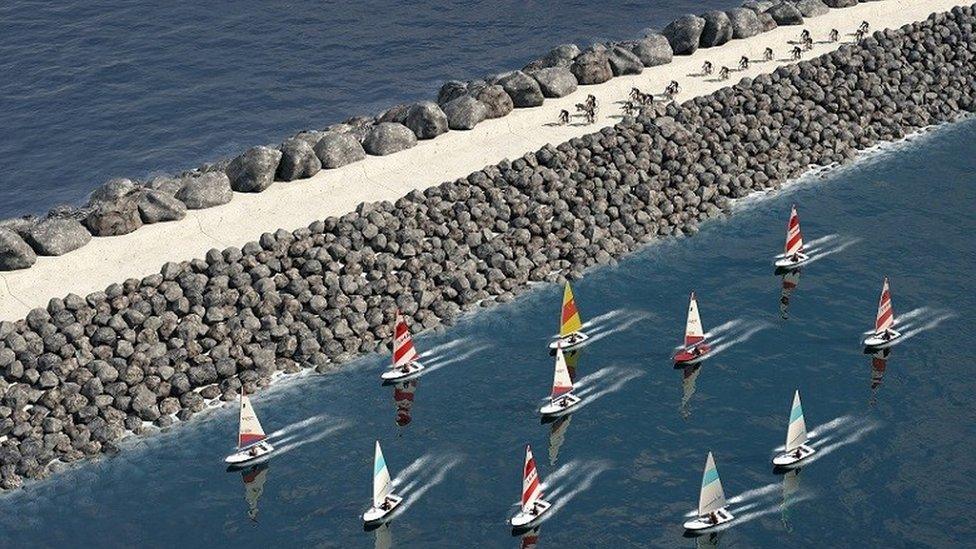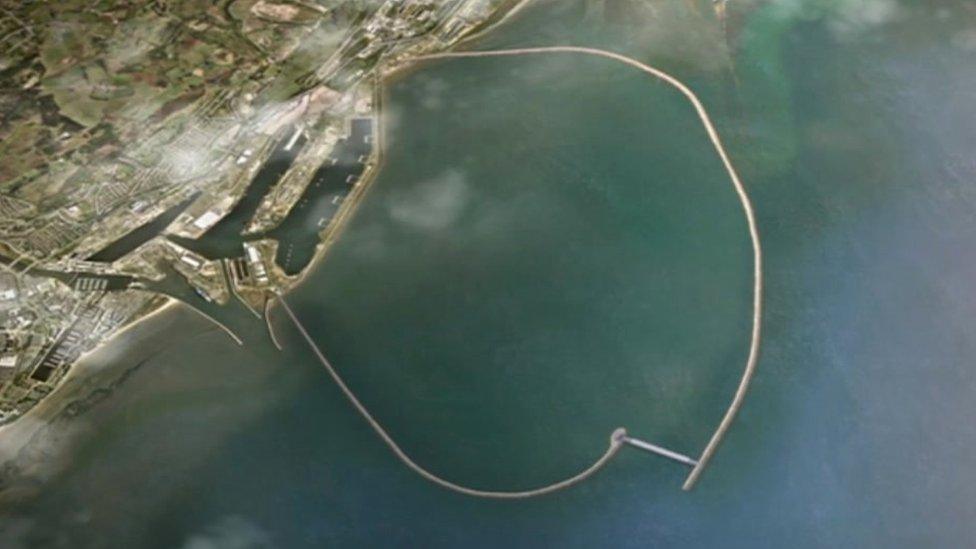Swansea Bay Tidal Lagoon planning permission expires
- Published

The UK government declined to back the project in 2018
Developers behind the Swansea Bay Tidal Lagoon no longer have planning permission to build the project, the UK government has said.
Tidal Power PLC claims to have secured permission "in perpetuity" for the scheme by doing work on the site.
But despite that, both UK ministers and Swansea council insisted permission expired at the end of last month.
Swansea council said no part of the scheme "may now proceed".
A representative for the developer said: "We have received clear legal advice in support of this position and it remains our position."
Hopes for UK government support for the £1.3bn scheme were dashed in 2018 when ministers said it was not value for money.
Tidal Power, a company formed following the loss of UK government backing and led by chief executive Mark Shorrock, then sought investment of £1.2m by selling shares in 2019.
The cash was to be raised to, according to the company's website, "protect the Swansea project".

The Swansea Bay Tidal Lagoon was thought to cost £1.3bn
To do this, the company said it began work on 29 June on the site before the development consent order (DCO) - the permission for the project - expired on 30 June.
It said the work secured "in perpetuity the planning permission for Swansea Bay Tidal Lagoon". The work included demolition of a wall and site clearance, and continued from 29 June to 3 July, according to the representative of Mr Shorrock.
But a letter from Business Minister Kwasi Kwarteng to the developers made it clear the UK government still considered the DCO to have expired, despite the developer's claims.
Before work could begin, a plan on how the scheme would be dismantled - or decommissioned - was required by UK government.
Mr Kwarteng wrote that developers submitted that plan in May, just two months before the expiry date.
"As the [decommissioning] programme was submitted so close to the DCO expiry date and, following examination, was not in a suitable state to recommend approval, the DCO expired."
Citing the statement from Tidal Power about the work, he said the department's position "remains clear".
The local authority, Swansea, said in June that the work was "unlawful" as it failed to meet "the requirements of the Development Consent Order which need to be complied [with] before development commences".

The lagoon would have been off the coast of Swansea Bay
A Swansea Council spokesman said: "The council continues to take independent legal advice on this matter.
"We wrote to Tidal Power PLC on 8 July to confirm that the development consent order had expired because the company had failed to meet its requirements within the five-year timescale set out in the DCO.
"As the DCO has lapsed, no part of the previously authorised development may now proceed in the absence of further order or other consent.
"The council is monitoring the situation on site and will take appropriate action should that be necessary."
'Not a good deal for consumers'
Under new laws in 2017, any further order to develop the project would now need to be obtained from the Welsh Government.
The Welsh Government said no such application to extend the DCO was made by Tidal Lagoon Power before the 30 June permission expiry date.
A UK government spokesperson said: "We will continue to explore marine technologies that harness the natural energy of our tides and offshore wind, but any proposed project must provide value for money for the consumer.
"Following extensive analysis, the Swansea Bay Tidal Lagoon project did not meet this criteria as it would not have delivered a good deal for consumers.
"However we will continue to examine more cost-effective projects to create green jobs and reach net zero emissions by 2050."

Analysis by Ione Wells, BBC Wales Westminster correspondent
On 22 June, Tidal Power promoted the Swansea Bay Tidal Lagoon as one of the 'shovel-ready projects' that could get the economy going post-coronavirus.
But it was not ready to shovel anything in the eyes of the UK government.
It, and Swansea Council, have been clear the company failed to meet its requirements within the five-year timescale set out by their planning permission. That is why the permission expired.
This is directly at odds with what the company claim, which is that - because they did some site clearing work the day before the permission expired - their permission now lasts "in perpetuity". In other words, indefinitely.
What is not clear yet is what changed between 22 June, when the company said they needed their decommissioning plans approved by the UK government to begin work, and 29 June when that work actually did begin.
Nor is it clear what plans they have now that the council has said action could be taken against them if any part of the development continues without gaining further permission from the Welsh Government.
- Published25 June 2018

- Published4 December 2019
